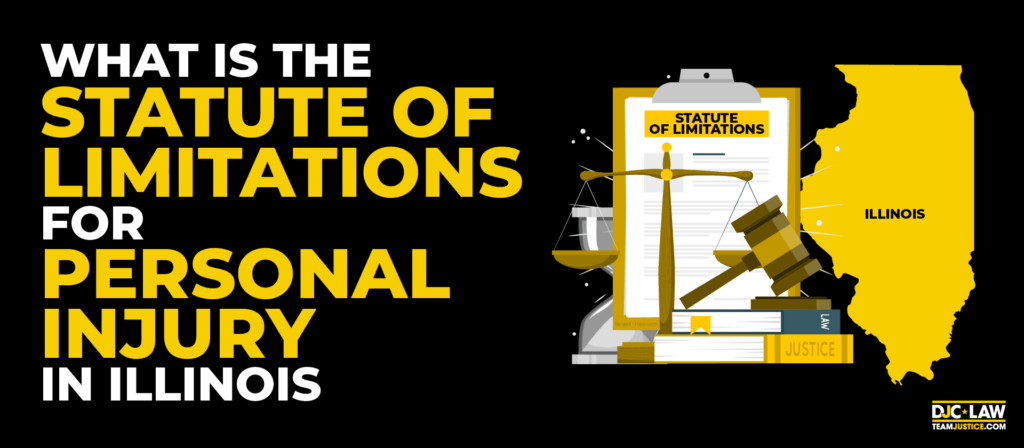
One of the quirks of the U.S. is that the statute of limitations for practically every type of case differs depending on where you are. Personal injury claims are no different, with time limits differing based on the state.
Illinois has one of the shortest statutes of limitations, with just two years from the date of your accident to file your lawsuit. According to a study conducted by the Bureau of Labor Statistics, there were 112,500 nonfatal workplace injuries and illnesses reported in Illinois in 2022, that’s a lot of people who probably missed their deadlines.
Let’s go through some scenarios to understand how the statute of limitations works if you’re searching for Chicago personal injury help.
Key Takeaways
- The statute of limitations for most personal injury claims in Illinois is two years.
- Non-immediate injuries also have a discovery rule, meaning the statute of limitations doesn’t begin until you discover or should have discovered your injury.
- Workers’ compensation claims have a statute of limitations of three years, but illnesses and injuries must be reported within 45 days.
- Injuries on government property have a different process, requiring you to file separate notices of claim and only then file a traditional personal injury claim.
- The statute of repose bars all legal actions after a certain period, regardless of the statute of limitations or the discovery rule.
- Some exceptions exist to the statute of limitations, including if the victim is under 18 or the defendant leaves the state.
How Long Do I Have to File a Personal Injury Lawsuit in Illinois?
You’ve got two years from whenever the incident happened to file your case. This means if you’re looking for Chicago personal injury lawyers, you must sue for medical bills, lost wages, pain and suffering, and anything else before this timeline elapses.
What does a personal injury mean? It means you suffered due to someone else’s negligence, actions, or inactions. Any injuries sustained could be because of either negligence or intentional tort.
- Negligence – Negligence means there was an accident or mistake that ended in you being injured.
- Intentional Tort – These cases are where you were harmed intentionally by another party on purpose. For example, you may have been the victim of defamation or fraud, but it could also extend to assault.
In the latter case, intentional acts often mean criminal charges, too. You’ve got the right to lodge civil personal injury claims for damages even if the other party is also looking at a criminal case. And these can happen simultaneously.
Note that criminal charges have different statutes of limitations in Illinois, and they’re often longer.
What is the Statute of Limitations for Auto Accidents?
Illinois is an at-fault state, meaning that if you’re involved in an accident, you’ve got the right to sue the person who was at fault. Believe it or not, auto accidents count as personal injury lawsuits. Like all other cases in this category, you’ve got two years to file your case.
Remember, the law on filing your case applies to anybody who might have contributed to the harm you suffered. This may be another driver, but it could also be a passenger or a pedestrian.
What is the Statute of Limitations for Truck Accidents?
Truck accidents are a type of auto accident that falls into the “personal injury” category. Like other personal injury cases, your Illinois attorney must file your case within two years of whenever the truck accident occurred.
What is the Two-Year Deadline, and What Personal Injury Cases Does it Involve?
The two-year deadline on Illinois personal injury cases applies to when you file the case. Many people believe they must file immediately because if they haven’t received a verdict or settlement by then, they lose their opportunity to claim compensation, but this isn’t true.
There is no time limit on how long a case can drag on. According to a study by The Law Dictionary, 95% of civil cases reach a settlement at some stage, so you might not wait as long as you think. However, contentious or high-value cases could continue for years. The statute of limitations does not affect this.
For example, did you know the longest civil lawsuit dragged on for 60 years? In the 19th century, Myra Clark Gaines fought for most of her life to receive an enormous inheritance. To this day, the U.S. Supreme Court says it’s one of the most remarkable cases in their archives. Even though this case had a statute of limitations, the time limit ceased to be an issue once it was filed.
What is the Statute of Limitations for Workers’ Compensation in Illinois?
Workers’ compensation cases may involve a personal injury, but the statute of limitations is longer at three years. This means you have three years from whenever your injury occurred to file your benefits claim.
Can you also lodge a personal injury lawsuit with an Illinois lawyer? Unfortunately, this is complicated because technically, you can, but the Land of Lincoln is like most states in that there are exclusive remedy laws in place.
Exclusive remedy laws mean that in most cases, an injured worker must file for workers’ comp, but there are some incidents whereby you can file both. Speak to an experienced personal injury lawyer about whether you can file for workers’ comp and personal injury.
What is the Statute of Limitations for Wrongful Death in Illinois?
Personal injuries can lead to a wrongful death case, but you don’t have the two-year statute of limitations for these cases. Instead, the statute of limitations begins from the date of death, not the date of the injury.
The distinction is made between the date of the injury and the date of death because someone may experience a serious injury and then later pass away. Having this extra quirk in place enables families to still make claims for rightful compensation if their loved one dies from their injuries.
According to the U.S. Bureau of Labor Statistics, there were 177 fatal work injuries in Illinois in 2022. It’s in cases like these that exceptions allow families to seek the closure they need.
What is the Statute of Limitations for Medical Malpractice in Illinois?
Medical malpractice lawsuits also fall into the personal injury category. In Illinois, the two-year statute of limitations applies not from the date of treatment but from the date of discovery.
The date of discovery is when the patient found – or should have found – that their injuries were caused by medical malpractice. These are exceptionally difficult cases as defendants often wrangle over when the date of discovery was. If you’re filing a personal injury claim for medical malpractice, retain all medical records to make it easy to establish the date of discovery.
Unfortunately, Illinois also has another rule in place for medical malpractice cases. Regardless of the discovery date, you can’t file one of these claims if more than four years have passed since the date you received treatment.
What is the Statute of Limitations for Injuries on Government Property?
Personal injuries sustained on government property work differently from those experienced on private property. The law states you must file a notice of claim before filing a lawsuit. If your injury was on state government property, your notice of claim has to be filed with the Illinois Court of Claims. Injuries involving local government property require you to file your notice with the local government itself.
In both cases, the Illinois personal injury statute of limitations to file your notice of claim is one year. If you don’t get the result you want, then you can proceed to file an immediate personal injury lawsuit.
But what about federal property in Illinois? Unfortunately, the same rules apply nationwide for federal property. You’ve got two years from the date of your injury to file, but this must be an administrative claim filed with the federal agency in question. If you don’t get your claim approved, you have six months from your denial to file a lawsuit, but this has to be through a federal court.
When Do I Need to Report an Accident in Illinois?
Filing a lawsuit and filing an accident report are two different things. Here’s what to do after a car accident in Illinois. With an auto accident, the key to your case is filing an official accident report. If a police officer attends the scene, they’ll fill out the form and file it immediately, with a copy provided to each party.
However, if an officer doesn’t attend, which isn’t uncommon with minor accidents, you’ll need to file your accident report with the Illinois Department of Transportation. This can be done online and should be one of the first things you do after an accident.
Different types of claims may have other reporting procedures. For example, according to the Illinois state government, if you sustain an accidental injury or illness in the workplace, you must report it within 45 days. This can be done orally or in writing, but written documentation is always best to avoid doubt later.
Are There Exceptions to the Statute of Limitations in Illinois Personal Injury Cases?
Yes, several exceptions exist for the Illinois statute of limitations, including if the personal injury victim is a minor or a mentally handicapped individual. There are also special rules that apply to government agencies/employees or if the defendant crosses state lines.
Here’s a rundown of how these exceptions work:
- Minors – If the victim is under the age of 18, the statute of limitations is paused until they reach their 18th birthday. In other words, if a victim is injured at 14, they would have until their 20th birthday to file their personal injury case.
- Mentally Handicapped – Victims with mental disabilities can have the statute of limitations paused if they’re proven to understand their legal rights or pursue a claim. However, if they have a disability that isn’t considered a barrier to filing, the statute of limitations proceeds as usual.
- Government Agencies/Employees – As discussed earlier, different procedures apply if your injury occurs on local, state, or federal property, such as filing a notice of claim before filing a personal injury suit.
- Defendant Leaving the State – The Illinois statute of limitations is automatically paused if the defendant crosses state lines. For example, if a defendant departs and returns to Illinois 20 years later, what’s left of the two-year statute of limitations would still apply.
Can the Statute of Limitations Be Extended in Illinois?
In rare cases, the statute of limitations in Illinois can be extended. Examples include a defendant leaving the state and the discovery rule, which often applies to medical malpractice cases.
Under the discovery rule, the statute of limitations only begins when you discover your injuries or should have discovered them. Caps exist on this, though, such as with medical malpractice cases, where the additional statute of limitations is four years from when you received medical treatment, overwriting the discovery rule.
What is the Discovery Rule for Illinois Personal Injury Claims?
The discovery rule is when a victim discovers their injury or should have discovered their injury, and only then the two-year statute of limitations begins.
Since some injuries take time to appear, especially regarding medical malpractice, the discovery rule ensures you still have the right to file a claim.
What is the Statute of Repose, and How Does it Differ from the Statute of Limitations?
The statute of repose bars legal action within a set timeframe, regardless of whether you’ve been injured or not. The primary difference is when the clock to launch your claim with a Chicago personal injury lawyer begins.
It’s designed to push plaintiffs to move quickly and stop the courts from being clogged by frivolous legal actions years later. For example, the statute of repose on medical malpractice is four years, with the statute of limitations being two years.
What if the Person Who Caused Your Injury Leaves Illinois?
While frustrating, it doesn’t matter if the person who caused your injury leaves Illinois. If there’s proof that they’ve crossed state lines, the statute of limitations automatically pauses and resumes on their return.
Of course, if they never return to Illinois, there’s nothing you can do to file your claim against them.
Does the Statute of Limitations Change if I am Not at Fault?
The statute of limitations applies to how long you have to file a claim, not who was at fault, since this can’t be established before you file. There are no special Illinois at-fault laws that alter the statute of limitations.

